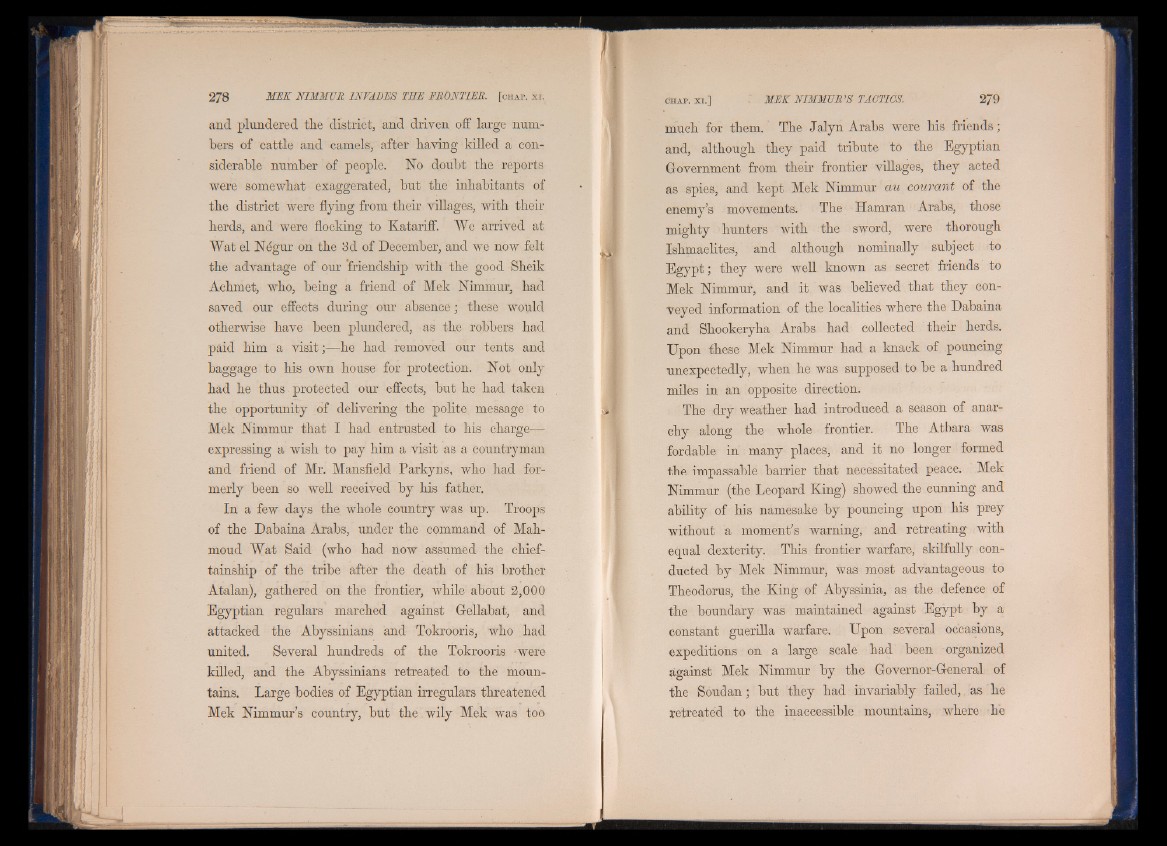
and plundered the district, and driven off large numbers
of cattle and camels, after having killed a considerable
number of people. No doubt the reports
were somewhat exaggerated, but the inhabitants of
the district were flying from their villages, with their
herds, and were flocking to Katariff. We arrived at
Wat el Ndgur on the 3d of December, and we now felt
the advantage of our friendship with the good Sheik
Achmet, who, being a friend of Mek Nimmur, had
saved our effects during our absence; these would
otherwise have been plundered, as the robbers had
paid him a visit;—he had removed our tents and
baggage to his own house for protection. Not only
had he thus protected our effects, but he had taken
the opportunity of delivering the polite message to
Mek Nimmur that I had entrusted to his charge—-
expressing a wish to pay him a visit as a countryman
and friend of Mr. Mansfield Parkyns, who had formerly
been so well received by his father.
In a few days the whole country was up. Troops
of the Dabaina Arabs, under the command of Mah-
moud Wat Said (who had now assumed the chieftainship
of the tribe after the death of his brother
Atalan), gathered on the frontier, while about 2,000
Egyptian regulars marched against Gellabat, and
attacked the Abyssinians and Tokrooris, who had
united. Several hundreds of the Tokrooris -were
killed, and the Abyssinians retreated to the mountains.
Large bodies of Egyptian irregulars threatened
Mek Nimmur’s country, but the wily Mek was too
much for them. The Jalyn Arabs were his friends;
and, although they paid tribute to the Egyptian
Government from their frontier villages, they acted
as spies, and kept Mek Nimmur cm courant of the
enemy’s movements. The Hamran Arabs, those
mighty hunters with the sword, were thorough
Ishmaelites, and although nominally subject to
Egypt; they were well known as secret friends to
Mek Nimmur, and it was believed that they conveyed
information of the localities where the Dabaina
and Shookeryha Arabs had collected their herds.
Upon these Mek Nimmur had a knack of pouncing
unexpectedly, when he was supposed to be a hundred
miles in an opposite direction.
The dry weather had introduced a season of anarchy
along the whole frontier. The Atbara was
fordable in many places, and it no longer formed
the impassable barrier that necessitated peace. Mek
Nimmur (the Leopard King) showed the cunning and
ability of his namesake by pouncing upon his prey
without a moment’s warning, and retreating with
equal dexterity. This frontier warfare, skilfully conducted
by Mek Nimmur, was most advantageous to
Theodorus, the King of Abyssinia, as the defence of
the boundary was maintained against Egypt by a
constant guerilla warfare. Upon several occasions,
expeditions on a large scale had been organized
against Mek Nimmur by the Governor-General of
the Soudan; but they had invariably failed, as he
retreated to the inaccessible mountains, where he